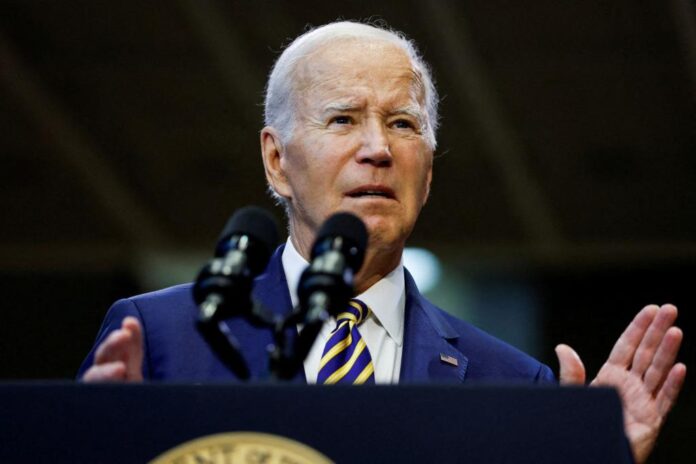The US-Saudi relationship soured when President Biden took office, and now Biden’s re-election prospects may suffer, too.
Back on Nov. 21, 2018, just two weeks after the midterm elections, then-President Donald Trump celebrated recent declines in the global oil price with a tweet, ending with: “Thank you to Saudi Arabia, but let’s go lower.”
About six weeks earlier, the West Texas Intermediate oil price had peaked at $76.40 per barrel.
By Nov. 6, when American voters took to the polls, it was at $61.69 — a fall of around 24% in only a month.
Gas prices at the pump had dipped, too. In the second week of October, they’d peaked at around $2.90 per gallon.
On Election Day, they were down to $2.75 per gallon — and by January 2019, $2.24.
The Saudis had done Trump a favor: They’d agreed to pump more oil around the same time as the midterms and drive down the price of gas.
In return, Trump praised them at a time when they were under attack by the press for the murder of the journalist Jamal Khashoggi in the Saudi Embassy in Turkey.

Trump may have been aiming to boost the GOP’s fortunes in the midterms, but voters seem to associate gas prices more with the executive branch.
In any case, the relationship between Saudi Arabia and the White House now is in far worse shape than when Trump was president.
The Biden administration blamed the Saudis for Khashoggi’s murder and shunned the kingdom when the current president took office. Looks like the Saudis haven’t forgotten.
Two weeks ago, newspaper reports emerged that they and the Russians had decided to cut oil production and drive the oil price up to $100 — just a year before Biden faces off against Trump for re-election.
Prices are already starting to rise: In late August, the West Texas Intermediary price stood at around $80 a barrel; on Monday, it had risen to over $91 a barrel.
Gas prices are starting to march up, too. In December, the average was $3.09 a gallon; today it’s $3.88.
Expect gas prices to keep climbing as the Saudis and Russians squeeze markets.
This isn’t good news for Biden. Gas prices are a hot-button issue in any election, but with inflation having eroded living standards and raised costs for households, any further jump in gas prices will be particularly painful.
Presidents who’ve overseen energy price hikes haven’t fared well.
Ronald Reagan was first elected after the Carter administration ruled over sky-high energy prices.
When the 1980 election took place, the price of oil had risen 136% from where it was in early 1979. The American public widely viewed the Democrats as having mismanaged energy.
In 1984, Team Reagan saw prices fall around 9% in the weeks running up to the election. The result was a landslide victory in which Reagan won 49 states.
George H.W. Bush pulled off the same trick. In the run-up to the 1988 election, the Reagan-Bush administration presided over a 22% decline in prices.
Voters associated falling energy prices with Republicans, and Bush won 40 states.
President Bill Clinton gave voters a 5% fall in oil prices in 1996; they gave him 31 states.
In the run-up to the 2004 election, the George W. Bush administration presided over a 9% plunge in oil prices and also took 31 states.
Finally, President Barack Obama delivered an 18% oil price drop in 2012 and won 26 states.
In only two elections did the incumbent party preside over a fall in energy prices and still lose: the 1992 race between Bush Sr. and Clinton, and the 2016 square-off pitting Hillary Clinton against Trump.
Bill Clinton’s election took place while voters still remembered the 1990-91 recession under the elder Bush, and Trump was a total wild card.
With the Saudis now unwilling to play ball, the only thing that could drive oil prices down is a recession.
But the single best predictor of presidential elections is a recession: In the four elections that have taken place during or shortly after a recession, every single incumbent or his party lost.
Biden seems to be between a rock and a hard place.
Rising oil prices are a strong predictor of him losing; the odds of that based on history are around 71%.
And the only thing that can lower those prices — a recession — will also almost surely mean his defeat.
Joe had better get pumping.
Philip Pilkington is a macroeconomist and investment professional.



